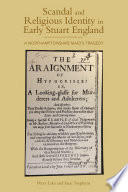

Most ebook files are in PDF format, so you can easily read them using various software such as Foxit Reader or directly on the Google Chrome browser.
Some ebook files are released by publishers in other formats such as .awz, .mobi, .epub, .fb2, etc. You may need to install specific software to read these formats on mobile/PC, such as Calibre.
Please read the tutorial at this link: https://ebookbell.com/faq
We offer FREE conversion to the popular formats you request; however, this may take some time. Therefore, right after payment, please email us, and we will try to provide the service as quickly as possible.
For some exceptional file formats or broken links (if any), please refrain from opening any disputes. Instead, email us first, and we will try to assist within a maximum of 6 hours.
EbookBell Team

5.0
60 reviewsA window into the mental and cultural worlds of the Stuart period, capturing the existing religious, social and political tensions on the eve of the English Civil War.
This book starts with an extraordinary event and document. The event is the trial and execution for infanticide of a puritan minister, John Barker, along with his wife's niece and their maid, in Northampton in 1637; the document,what appears to be a virtual transcript of Barker's last speech on the gallows. His downfall soon became polemical fodder in scribal publications, with Puritans circulating defences of Barker and anti-Calvinists producing a Laudian condemnation of the minister.
Scandal and Religious Identity in Early Stuart England uses Barker's crime and fate as a window on the religious world of early modern England. It is based upon an extraordinary deposit of manuscript and printed sources, all produced between 1637 and 1640 by people living in close proximity to one another and all of whom knew one another, either as friends or more often as enemies. Marshalling evidence frompublic polemical sources and from almost entirely private ones - a diary, private letters and a spiritual autobiography - the book is able to examine the same events and persons, and beliefs and practices, from multiple perspectives: the micro and the macro, the personal and the political, and the affective and the doctrinal. Throughout, we meet a range of very different people putting various bodies of religious theory into practice, connecting the most local and particular of events and rivalries to the great issues of the day and responding, in certain cases, to the promptings of the Holy Spirit and the temptations of the devil.
This approach enables a whole series of generalisations to be explored: about the relation between politics and religion, devotion and polemic, puritans and their enemies, local and national affairs; between rumour, manuscript and print; and, finally, about gender hierarchyand the social
…